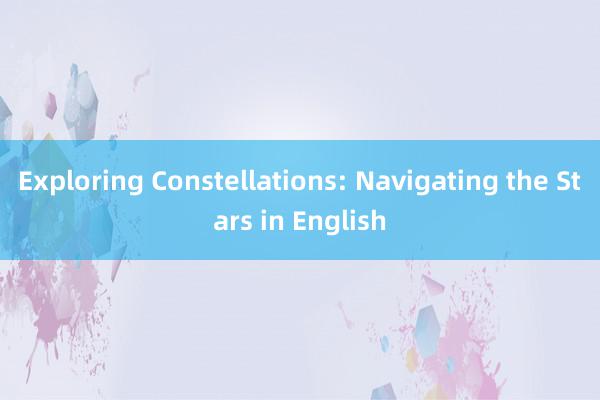
### Exploring Constellations企业-扬安亚咖啡有限公司: Navigating the Stars in English
威海霖铖国际贸易有限公司In the vast and timeless canvas of the night sky, constellations serve as our celestial maps, guiding explorers and dreamers through the mysteries of the universe. These ancient patterns of stars, woven into stories by cultures across the globe, have not only provided a sense of direction for travelers but also inspired countless works of art, literature, and science. In this exploration, we delve into the beauty and significance of constellations, navigating their historical and cultural relevance to our modern understanding of the cosmos.
#### Historical Significance
The origins of constellations can be traced back to prehistoric times when early humans began to notice and name patterns in the night sky. Ancient civilizations such as the Babylonians, Greeks, and Egyptians developed elaborate systems of constellations to assist with navigation, agriculture, and religious ceremonies. For instance, the constellation Orion was so significant to the ancient Greeks that it was associated with the god of hunting, 哈尔滨都市网 - 免费发布便民信息|哈尔滨本地分类信息网 Zeus's son,首页-九嘉宝颜料有限公司 Orion. These stories not only enriched the cultural fabric of these societies but also provided a framework for understanding the night sky.
#### Cultural Diversity
Across different cultures, 海口市开富潮百货店 constellations have taken on unique meanings and stories, reflecting the diverse perspectives and mythologies of humanity. The Chinese, for example, recognized 28 main constellations known as "the Great Clans" and "the Small Clans,企业-扬安亚咖啡有限公司" each with its own narrative. In contrast, the indigenous peoples of North America saw constellations as part of their creation myths, linking celestial bodies to important events in their history and cosmology. This cultural diversity highlights the universal appeal of constellations and their role in connecting people to their heritage and the natural world.
#### Scientific Relevance
As our understanding of astronomy evolved, constellations became an essential tool for scientific inquiry. They provided a reference system for cataloging stars, which was crucial for the development of astrophysics. The International Astronomical Union (IAU) standardized the names and boundaries of constellations, ensuring a universal language for describing positions in the sky. Today, constellations are used in various applications, from satellite tracking to the identification of distant galaxies, demonstrating their enduring relevance in modern science.
#### Modern Appreciation
In the contemporary world, constellations continue to captivate both amateur and professional astronomers alike. Observatories and planetariums offer interactive experiences that allow visitors to explore the night sky through the lens of constellations, enhancing public engagement with astronomy. Moreover, the advent of space exploration has led to a renewed interest in the constellations, as astronauts and space enthusiasts look to the stars for inspiration and guidance during their journeys beyond Earth.
#### Conclusion
Constellations, with their rich history, cultural significance, and scientific utility, stand as a testament to human curiosity and creativity. They bridge the gap between the past and present, offering a timeless connection to the cosmos. Whether gazed upon by ancient civilizations or explored through modern telescopes, constellations remain a cherished aspect of our shared human experience, guiding us through the infinite expanse of the universe.